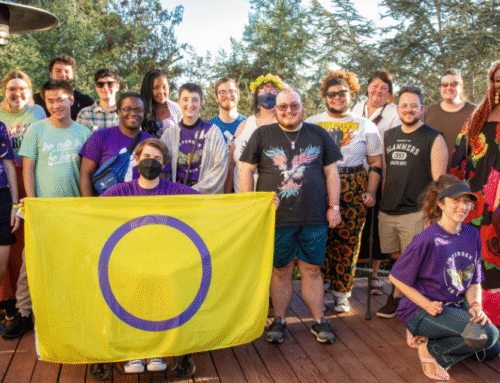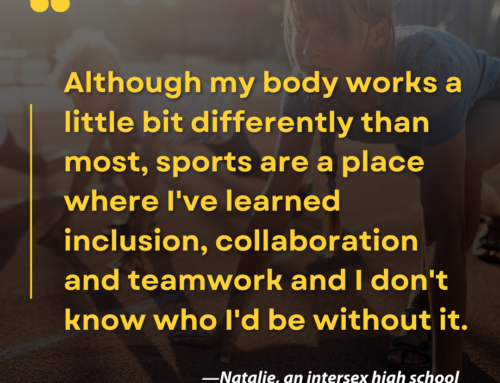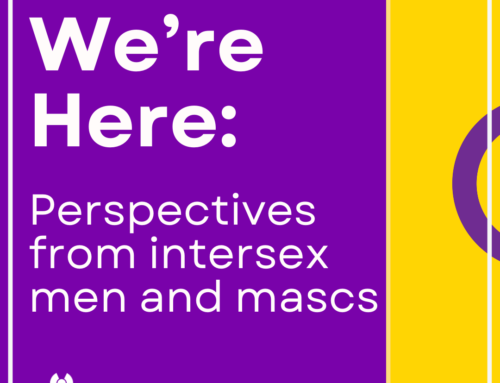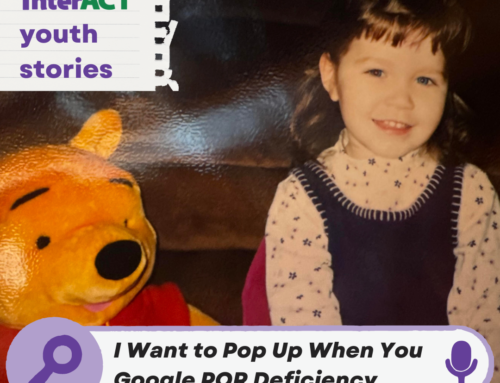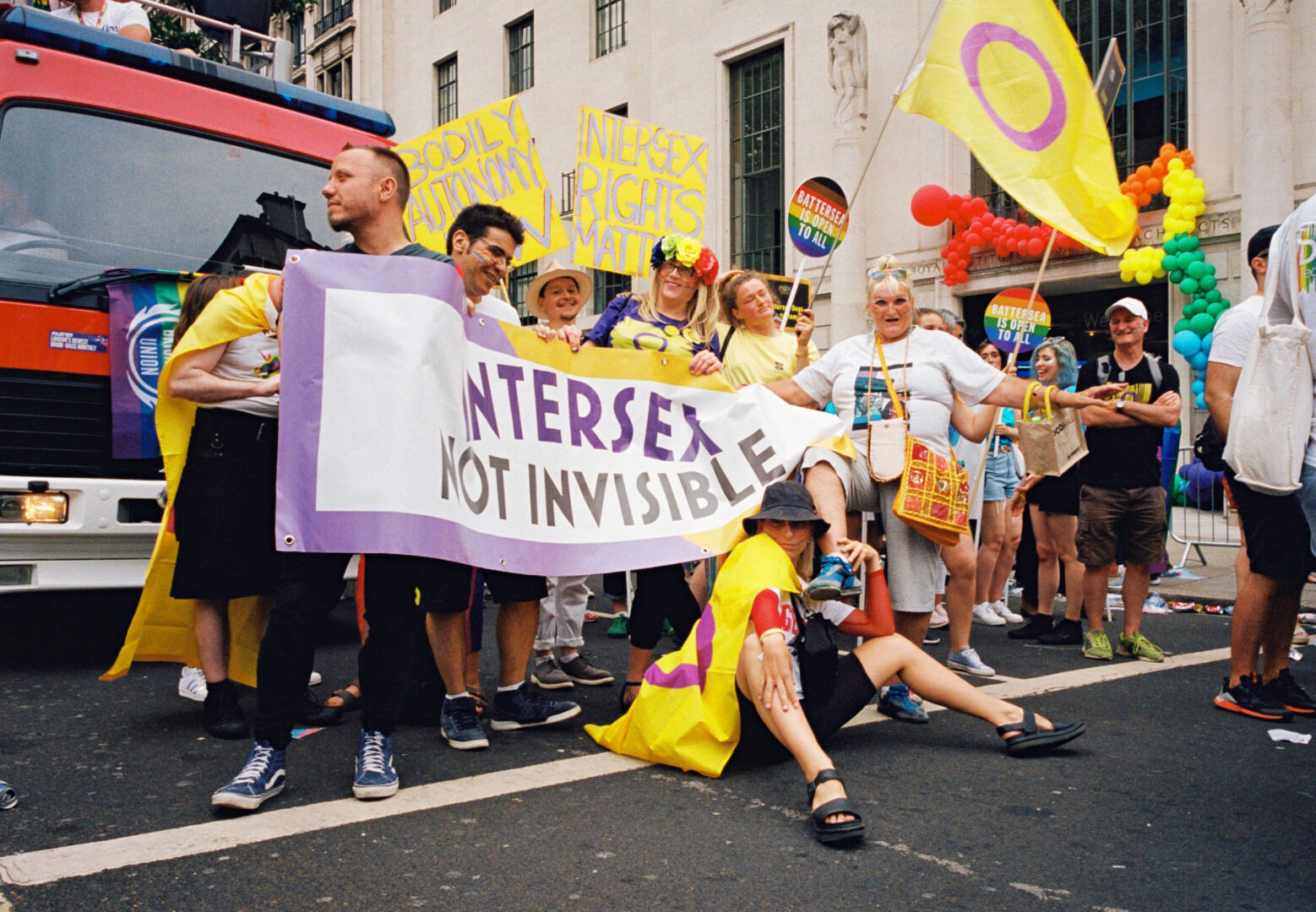
Intersex Pride Parade in London, from Dani Coyle
Emma Nutt (she/her) is an interACT youth cohort member living with xx/xy intersex chimerism. She is interested in linguistics and biology, taking a personal interest in entomology more specifically. In her spare time she enjoys making art and having fun by messing around with vocaloids.
As is often the case for intersex people existing online, it is certainly not uncommon for us to run into arguments where people speak about us without actually understanding who we are. We are often reduced to pawns or treated as minute, irreconcilably rare mutations that can be promptly ignored and cut out from larger society.
There are individuals who shun the use of the term “intersex”, claiming that it is a word which “creates a false impression of a sex which lies between male and female”. Instead, such individuals propose using the term “disorder of sexual development (DSD)” to describe intersex variations, with the person-first term being “person with a DSD”. The same individuals also tend to strongly disagree with describing such perceived disorders as “differences in sexual development” and “variations in sexual development” as well, believing that these terms also downplay the severity of the intersex condition and experience. I argue that this trend of describing intersex variations as disorders in both medical and non-medical environments is at best ignorant of how intersex conditions are weaponized by our political enemies and at worst is a politically-driven linguistic push towards less intersex autonomy.
This trend of describing intersex variations as disorders in both medical and non-medical environments is at best ignorant of how intersex conditions are weaponized by our political enemies and at worst is a politically-driven linguistic push towards less intersex autonomy.
The term “intersex” was originally coined in 1915 by endocrinologist Richard Goldschmidt while studying moths which displayed both male and female characteristics (gynandromorphism). This term, as it was coined, was later extended to encompass similar variations in sexual development among humans as well. Since then, “intersex” has (very observably) been the default terminology in describing such variations. As knowledge around intersex conditions began to change favorably in the early 2000s, urologists and other medical professionals voiced concerns about the clinical usage of the word “intersex”, feeling that it was a term rife with confusion as to what exactly an “intersex” condition would entail. In 2005 the European Society for Paediatric Endocrinology and the Lawson Wilkins Pediatric Endocrine Society convened in Chicago, Illinois to release the Chicago Protocol, maintaining “intersex conditions” instead be named “disorders of sexual development” in order to more accurately describe the medical phenomena. As this was purely clinical terminology, the use of the word “disorder” seemed to be obvious – these are conditions that often fall within the range of genetic abnormality and they are typically presented in a medical environment as something to address.
I have also been called a “disorder” as a singular noun so many times that the term itself has become a pejorative, another euphemism for “one of *those* hermaphrodites.”
It is for precisely this reason that I disagree with its use in any context, as it presents the idea that intersex people have “disorders” innate to our own bodies that must be fixed. In a lot of instances, variations in sexual development do require medical intervention in order to live a healthy life – though medical intervention in childhood and infancy is often unnecessary. I myself am entirely dependent on modern medicine in order to live. However, I have also been called a “disorder” as a singular noun so many times that the term itself has become a pejorative, another euphemism for one of *those* hermaphrodites. I would typically like to avoid continually spinning the euphemism wheel, but I maintain that the term “disorder” is too negatively loaded for it to continue being a useful term in both a medical and a non-medical environment. As any intersex person can attest, doctors don’t exactly know what they are doing with regards to variations in sexual development, anyway.
“Disorder” has acted as the grounds for vilification of intersex people and our bodies. “Disorder” has provided a basis in medical terminology for rationalizing non-consensual surgeries such as intersex genital mutilation.”
By using the terms variation of sexual development (VSD) and difference of sexual development (DSD) instead, we take out the connotations given to the word disorder when our bodies – our personhood – is being described. Some will argue that the lack of initiative ascribed to the words variation and difference as opposed to disorder will inevitably result in such conditions being taken less seriously and less likely to be medically addressed, and I disagree. If anything, it will actively continue to mark variations of sexual development that don’t need to be fixed as something that needs to be fixed – intersex genital mutilation being the most obvious example. When something is disordered, it is also necessarily dysgenic. They both render something as both incapable of functioning at a baseline and/or being unable to continue existing at the current state without negative consequences. It turns the question of being intersex from “how do I help one live with being intersex” to “how can I prevent one from being intersex”. Utilizing this language is almost inherently harmful to the goal of adequately solving the issue at hand, especially when intersex people already face the social conception of being “weird biological freaks of nature.” Disorder is then, in this context, a fundamentally politicized word. Disorder has acted as the grounds for vilification of intersex people and our bodies. Disorder has provided a basis in medical terminology for rationalizing non-consensual surgeries such as intersex genital mutilation. The word Disorder – in any context – conjures and perpetuates this conception of intersex people being immutably dysgenic, and as such should be shied away from entirely.


